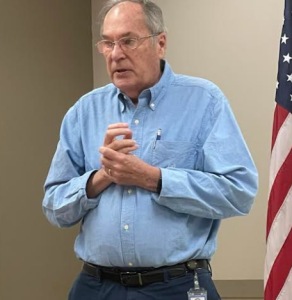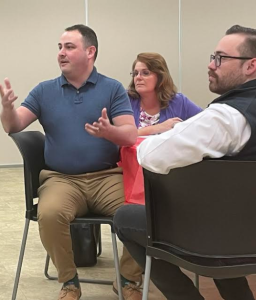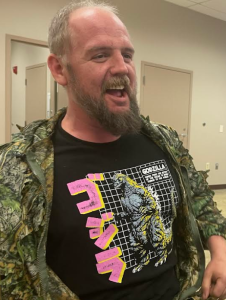By Patricia A. Scheyer
NKyTribune reporter
Bob Yeager, Chief District Engineer from District 6 in the Kentucky Transportation Cabinet, came to the monthly mayors’ meeting, held at the Edgewood Senior Center on Saturday, to introduce two new members of the cabinet.
James Heatherly has been on staff for several months as a Public Information Officer, and last week Jake Ryle also started at the Cabinet as a Public Information Officer. Both were hired in the absence of Nancy Wood, who was the Public Information officer until she retired.

“We are going to hopefully upgrade public information, and do some new stuff,” said Heatherly, who will shortly have his drone license to be able to do video productions.
“If you have any issues with roads or anything like that, you can contact us,” said Ryle, who
worked for Channel 9 for five years prior to working at the Cabinet.
Yeager took over to explain what the Cabinet does.
“When I think about working with the cities, it’s always an interesting thing because I look at what we do and what you do, and there seems to be a conflict, and I’m wondering why there is that kind of conflict, because we’re all working for the same people, I just have more people that I represent,” said Yeager. “I looked at what our charges are, and your charges are to do the best you can for your city, and my charges are to do the best I can for the state.”
He said his main philosophy is to get people from point A to point B in the most efficient and effective manner possible. He explained that it could include taking out traffic signals, and letting people drive at a safe speed through towns. That might be counterproductive to what cities want to do, he thought, because cities usually want to slow people down.

He acknowledged that people in the side streets have to have their turn, but if the traffic signal goes for two and a half minutes, they may be able to get 100 cars through the intersection on the main street, whereas maybe two cars can get through in the same time from the side streets. He said the idea is to find the balance.
“So we want to spend more time getting to know you all,” he indicated all the mayors. “Getting to know what your concerns are, and hopefully, in those same conversations, you’ll get to know where we’re coming from. We just passed what we call a complete streets of processed policy, it’s an all involving thing, as a matter of fact it’s one of the newest in the country. The idea is there is some kind of happy medium.”
A question was asked about when the state plans to break ground on the 4th Street bridge in
Covington that crosses the Licking River to Newport.
“The 4th Street bridge will be the poster child for a complete street,” Yeager said. “It’s going to have the travel lanes, obviously, it’s going to have bike lanes, and it’s going to have sidewalks. So it’s going to be a complete connection.”
He said all he can say is that there is a lot of work to be done, and the environmental documents have to be done first. The idea is, he said, to have something done by the end of November. The utilities can be relocated, he explained, and the bridge type can be selected by the fall.
Other projects were asked about, and Yeager said every project is somewhere in the plan. He
told the group that the state is currently in the shift process. He said they will spend the entire year getting ready for the next biennium. Then they provide imput to the legislature, and the governor so they can create a six-year plan, which he says the federal government requires. But there are new projects and old projects, such as Kentucky 536, which has been on the books for 20 years, and they are all there in the plans somewhere.
More specifically, Yeager said Dixie Highway, from Buttermilk to the expressway, can’t be done yet because the money isn’t there, and he stated that they cannot do half of the project, because once the street is torn up the traffic has to be re-routed.
As an example of working around traffic, Yeager talked about if they are working on I-471, they can’t close all the lanes, but if they did they could do all the work in two weeks. But they can’t, and if they close two lanes, they get a five-mile backup.
Kenton County Judge Executive Kris Knochelmann asked if there was any one mistake that cities
make when they deal with the state on projects.

Someone joked that the mistake would be contacting the wrong legislator.
“Unless I’ve told you something you don’t want to hear, you might as well give it to me first,” Yeager said, adding that when people call a senator or representative, typically the call is given to him anyway. “Technically I don’t work for you, but I will work with you.”
He told the group that communications are a big thing, and he didn’t think any of the 11 counties, and 42 cities he deals with are significantly at odds, but he said he realizes that everyone has different priorities. And that, he segued, is why they have the two J’s, James and Jake, to get the word out.
“Our goal, as I mentioned, is for us to be able to be a point of contact for you all,” said Ryle. “We know the folks that you all are wanting to get in contact with. We can get those answers for you. If you have questions that you want to know or your constituents want to know, we know the right folks to be able to get the answers and get that information back to you guys. So our goal is to be able to have that level of transparency with you guys so you understand what is taking place at any given time and can let your folks know as well.”
Heatherly added that now that they have Jake on staff, it allows the rest of the department more time to accomplish other tasks, such as video production, and possibly a YouTube channel. He said they have revamped the newsletter.
They have started to add QR codes to be able to get out a lot of information to people in a
smaller information form, so as people get their information to Ryle, he promised to get information to them.
Walton mayor Gabe Brown attended the meeting while he was in the middle of a turkey hunt, but
he asked a few questions about his city. Then he asked a generalized question, after Yeager said they don’t have that much money, and sometimes they run out of money for projects.
“Is there something we (as a group) can do to get you more money?” he asked Yeager.
“Whatever money you give me, I’ll spend,” he said. “Transportation has a separate budget. We
should modify the way we get money.”

















